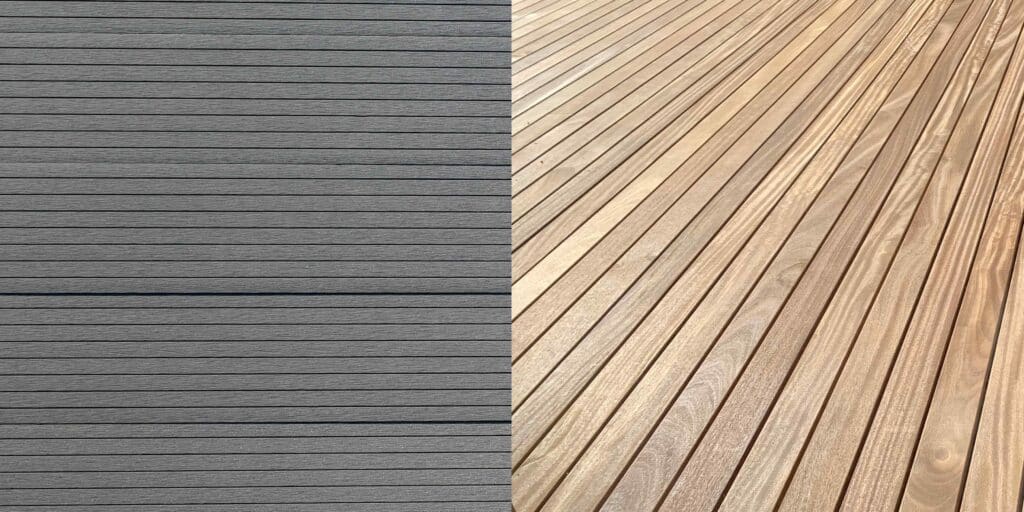Decking boards, Uncategorized
WPC and hardwood in comparison
WPC or wood? Advantages and disadvantages of WPC and wooden decking in comparison and what you should pay attention to when choosing decking. There are different materials from which decking boards are made. Therefore, we compare hardwood floorboards and WPC to make the decision easier.
What is Wood Plastic Composite?
WPC stands for Wood Plastic Composite, i.e. wood-plastic composite material. WPC floorboards consist of a mixture of wood fibers and plastics that are pressed into a solid material under high pressure and high temperature. WPC planks are available in different colors, shapes and surfaces. They are considered easy to care for, weather-resistant and long-lasting.
What are hardwood floorboards?
Hardwood floorboards are made from solid wood that comes from tropical or domestic tree species. Hardwood floorboards have a natural and elegant look. They are robust, durable, stable and resistant to pests and fungi. Hardwood floorboards turn gray over time, like all types of wood. To maintain the color, they must be oiled regularly. Well-known tropical hardwood species are Cumaru, garapa or Teak.
Both decking boards have their advantages and disadvantages that you should consider when making your decision:
optics
Hardwood floorboards have an incomparable beauty and charisma that cannot be matched by WPC floorboards. Hardwood floorboards have an individual grain, color and structure that give any outdoor area a unique character. WPC floorboards have an artificial and uniform look that is sometimes perceived as monotonous or inferior. WPC floorboards can also fade or yellow over time.
Storage
Hardwood floorboards, like Cumaru, Teak, Jatoba or garapa have a shelf life of at least 20-25 years. This corresponds to that durability class 1 and 2. Planks out WPC have different durability depending on the composition of plastic and plastic particles and processing. The respective manufacturer should provide information on this.
haptics
Hardwood floorboards have a pleasant and warm feel that invites you to walk barefoot. Hardwood floorboards feel natural and lively and adapt to the ambient temperature, but do not heat up as much in summer as stone and plastic. WPC floorboards have a smooth and cool feel that is perceived as uncomfortable or slippery. WPC floorboards can heat up significantly in summer and give off an unpleasant plastic smell.
ecology
Hardwood floorboards are ecologically more advantageous than WPC floorboards because they are made from a renewable and biodegradable raw material. Hardwood floorboards should be made of certified wood which is obtained from sustainable forestry. Certificates like FSC 100% or SVLK ensure a sustainable origin. WPC floorboards consist largely of plastic, which is made from petroleum. WPC floorboards are difficult to recycle and can contain harmful substances that pollute the environment. In addition, small plastic particles and microplastics can come off over time and end up in the garden or groundwater.
Costs
WPC floorboards are generally cheaper than hardwood floorboards, both to purchase and to install. WPC floorboards do not require any special fastening systems or substructures as they hardly warp or crack. Hardwood floorboards are often more expensive to purchase and screw spacing and ventilation of the terrace should be taken into account.
WPC or hardwood?
WPC floorboards are a cost-effective and easy-care alternative to hardwood floorboards, but they have disadvantages in terms of appearance, feel and ecology. Hardwood decking is a high-quality, natural choice for decking, but may require more investment and maintenance. The decision ultimately depends on your personal taste, budget and requirements. We recommend that you look at both decking boards in a specialist store and compare them before you decide. We would be happy to send pattern pieces to our hardwood floorboards.


